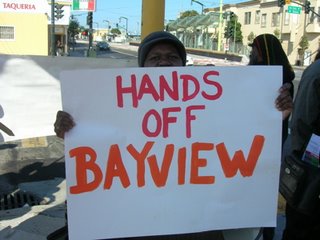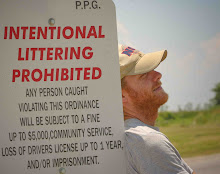 There was a spirited march and rally yesterday in San Francisco's Bayview/Hunters Point neighborhood to fight the SF Redevelopment Agency's planned overhaul of the area. Residents, activists, and supporters walked up 3rd street for several blocks and rallied on the spot where exactly 40 years prior to the day National Guard troops were brought in to quell a rebellion that sprang from the shooting of a local youth by city police. This "riot" was one of many that shook the nation during the late 1960s as ghetto communities erupted in anger and frustration at city regimes and a federal government that were actively working to dispossess people of their homes and businesses, not providing meaningful employment, waging a wasteful war abroad, and criminalizing non-white youth and the poor at home.
There was a spirited march and rally yesterday in San Francisco's Bayview/Hunters Point neighborhood to fight the SF Redevelopment Agency's planned overhaul of the area. Residents, activists, and supporters walked up 3rd street for several blocks and rallied on the spot where exactly 40 years prior to the day National Guard troops were brought in to quell a rebellion that sprang from the shooting of a local youth by city police. This "riot" was one of many that shook the nation during the late 1960s as ghetto communities erupted in anger and frustration at city regimes and a federal government that were actively working to dispossess people of their homes and businesses, not providing meaningful employment, waging a wasteful war abroad, and criminalizing non-white youth and the poor at home.The march and rally was called in response to the City Attorney's decision to invalidate the more than 30,000 signatures gathered to place the Redevelopment Agency's scheme on a referendum this Fall for voters to decide. The City Attorney, doing the bidding of the Mayor and other powerful players, fears that San Francisco's voters will reject the plans which call for a drastic overhaul of the neighborhood that would, opponents believe, push out the region's poor and effectively destroy the city's last majority black community. Organizers made repeated references throughout the day to the Fillmore which was redeveloped decades ago in a way that pushed out many poor and black families and broke the community's political power within the city. The Fillmore was once known as the Harlem of the West. It's redevelopment was one of the high profile projects nationwide that gave urban renewal its more straightforward nickname "Negro removal."
"Hands Off Bayview" is becoming a rallying cry out here echoing the name of the New Orleans based C3/Hands Off Iberville housing rights organization. Activists here in San Francisco identify with the struggle in New Orleans to save homes and community from the teeth of developers and politicians. Many speakers today acknowledged that the only difference between Bayview and New Orleans is
a hurricane. Otherwise the plans are the same: drive out the poor, especially poor people of color, and build highly profitable housing and amenities. But folks here are indignant and clearly won't let the land grab proceed without a fight.
There's more info at
http://www.indybay.org/newsitems/2006/09/25/18313976.php
